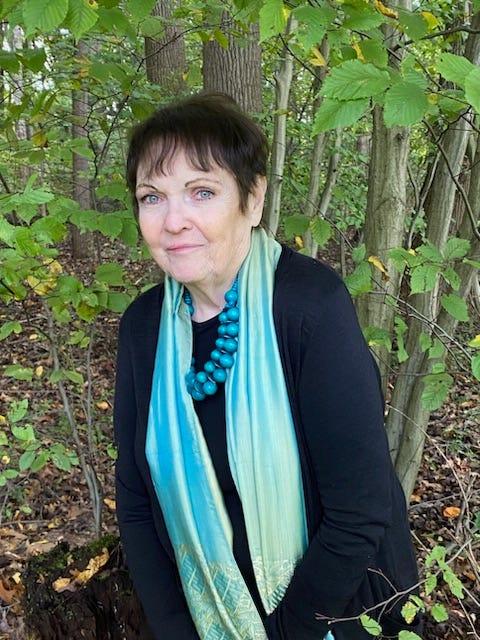I am a story carrier. That’s different from being a storyteller, because it focuses on the relationship between the story and the person who brings it to life on the page. Storytellers have certain kind of giftedness in the way they conjure up and share stories. They may use creative techniques to maintain their listeners’ attention as they roll out compelling, sometimes, supernatural fantasies. Story carriers are a bit different in that we know we are working at the mercy of tales that reside in the cosmos, waiting to be told through us. A story carrier functions as a conduit for the story and we understand, we are not always in control of the story, nor in the way it wants to be told. In fact, many of us believe we must honor the story by moving out of the way, allowing space for it to unfold on its own.
The first time I explained this concept, it was to my dissertation committee who listened to a summary of my years of research and findings from a case study conducted with published women writers. I had just spent years studying narrative theory and literature under the tutelage of the members of the committee in charge of directing my studies for a graduate degree. Then, I devoted another solid year to a case study focused on the way women are silenced or face conditions in an academic setting that can lead them to lose writing voice. When I shared my theory about the nature of story as a living force, the looks on their faces told me they were not impressed. One reacted as though I had removed the snakes from Medusa’s head and offered them the snarling reptiles on a platter. But I was pretty sure I knew what I was talking about. Afterall, I had been a story carrier for most of my life.
Pre-order my memoir, Story Carrier: A Collection of Tales of the Disappeared.
Stories have been with us since the beginning of time, in the form of myths, legends, fairy tales, and in other creative forms. Their importance as a technology for passing along knowledge is unquestionable. But I was talking about something different. What I was describing to my committee was the existence of an entity that is alive and moves under its own force, at a pace we cannot control.
More than fifteen years later, I still believe that carrying a story requires unique treatment by you, the writer, and sets unusual, exciting expectations for your audience. As a story carrier, you must believe in its magical power to function like a spell or incantation, casting new ideas, posing questions, creating new worlds that make the reader want to traipse across the pages and enter the tale. You must believe that stories move under their own power, flying across time and space, standing at the threshold of the ecotone, poised to cross with or without your assistance. You must understand that the story will wait for no one and will operate under its own rules of movement.
You’ll know when you are carrying a story, rather than telling one, because it will evoke a visceral response. A headache, a thud-thud-thudding in your heart, a deep sense of awe.
I have to admit that it was a little unnerving when I really understood the full power of story. I was in the midst of researching my family history, looking for factual data to write a section about my great grandmother for my memoir, Story Carrier: A Collection of Tales of the Disappeared. I’d spent hours perusing family trees on Ancestry.com, reading and re-reading old letters and cards, scrutinizing hazy, illegible legal documents, paging through online archives and newspaper obituaries, only to hit more roadblocks than one might encounter on a Pennsylvania borough main street. If you’re from the Keystone State, you might understand this. Otherwise, know that these roads are riddled with potholes that have been known to open up into sinkholes and swallow entire houses. My eyes were burning, my neck ached, and I was weary. Most of all, I was frustrated with my family, who had always been reluctant to share anything about this woman. In fact, they didn’t like to talk about family history in general, unless it was comprised of victories, successes, or accomplishments.
Of course, this is not terribly uncommon. Sarah Epstein, LMFT writes that most families tend hold 3 types of secrets: Individual, Internal, and Shared, all of them capable of causing life-long confusion and misunderstandings that result in broken or disrupted connections. In my family, we practiced all three forms of secret-keeping. I am not making this statement as a way of belittling anyone, nor to accuse them of concealing awful things as much as I’m trying to illustrate the power of story to overcome attempts to hide undisclosed information, displaying its natural quality for traveling across generational lines, often undetected.
In the case of my great grandmother, I was simply trying to verify the story passed in my family, that she and her husband had abandoned their daughter, my grandmother, leaving her with an elderly grandparent when she was six years old. It was a story that caused incredible suffering for my grandmother and left her with a compromised ability to form healthy relationships with her own daughters. I felt a strong pull to locate the source of the tale, believing that knowing the truth would untangle the confusion and, perhaps, mitigate some of the damage it caused the women in my family, including my mother and my relationship with her.
So, imagine my excitement when, months later, I stumbled onto the work of Dr. Galit Atlas, whose book, Emotional Inheritance, is an investigation of the power of untold stories to shape the lives of family members, even if they’d never heard the stories.
Dr. Atlas’ work is grounded in recent studies in epigenetics, which explains how an experience in the life of one person can alter gene expression, which is passed along to a family member in the next generation. As the theory goes, a grandchild may have a fear of being kidnapped which seems to have no grounding in reality. But the great grandmother of said child may have, indeed, been snatched by a stranger and harmed.
Without knowing the story, the grandchild’s fear is fed by the residue of the grandmother’s horrific memory of her experience. Atlas observes, “The people we love and those who raised us live inside us; we experience their emotional pain, we dream their memories, and these things shape our lives in ways we don’t always recognize.” Of course, she is describing generational trauma, which therapists have known about for years.
But, if it’s the case that bad things can become inherited memories, isn’t it also possible that exhilarating, stupendous, over-the-top events that took place in the lives of our early ancestors can also shape us. This is a rhetorical question, but you get my point.
If story is an entity, an energy with its own reality, its own power to move sight unseen, can it transmit any tale? What about stories of illness? In my memoir, I write about the death of my older sister, who lost her life to leukemia at the age of six. She suffered from Acute Lymphoblastic Leukemia, which is now the most easily cured form of the cancer, but it was deadly more than sixty years ago. The same form of leukemia struck my grandson half a century later and, although science has not established a genetic link to the disease, the story of cancer was passed from my sister to my grandson. This is one of several stories carried in my family, but it was, by no means, the only life altering tale that passed down through the generations, moving with such ease and invisibility that no one recognized it until the story unfolded in the life of another family member.
During the months that I continued to search for information about the life of my great grandmother, I discovered a shocking truth about her that no one seemed to know. Perhaps more important than the discovery is the way in which it came to me. One evening after I’d spent hours following the trail of questions I' had about the original story, I fell into a deep sleep where my great grandmother appeared to me in a dream and asked me to search for specific information about her life. She even gave me a hint about the location. I share the rest of the details in my book, but here’s the salient point. The story about her life had been hidden from the rest of the family in medical records held some two-thousand miles away from me, in an institution. From the grave, nearly a hundred years after she died, my great grandmother directed me to the dramatic tale of her life, which had been buried in my family for four generations. I would never have found this information on my own and, honestly, I’m not sure why I was able to get my hands on it, as it should have been protected by HIPPA laws. It was a story that was beyond anything I could have imagined even with all my years of experience as a journalist, researcher, or writer.
I wouldn’t call this a supernatural event; it was merely a dream that pointed me toward the information. What surprised me most was that the story was powerful enough to survive years of neglect, remaining in an untold state, waiting to appear under its own power to tell itself.
So, here’s the thing. In my family, stories are alive, and they move on their own volition, regardless of my intervention. I believe the stories we all carry will insist on being told, if not by the person to whom they originally happened, then, they will unfold in the lives of another person in the family, and it may be three or four generations later. It’s one of the magical properties of stories that they hide and reveal themselves when they decide to do so. So, open your eyes and ears. Ask about family stories, both those told and untold. When you find one, be careful to approach it with a certain amount of gentleness and humility, deferring to its power and magic. Listen deeply for bits and pieces to show up in unlikely ways and places. When they do, follow them across the thresholds of time and space into the mysterious tale that wants to be told.
Here's a prompt for you. “What family story (whether whole or partial) do you think you might be carrying? Hint: You may know more than you think so allow yourself to be led into the story whether you think it’s a true one or a piece of fiction.
My book, Story Carrier: A Collection of Tales of the Disappeared, is due for release on February 29, 2024.
Until. Jane







Thank you, Seraphina. My book comes out February 29th. I'll try to link it (as well as the second book I'm working on!)
Wonderful! I look forward to picking up your book!
“ As a story carrier, you must believe in its magical power to function like a spell or incantation, casting new ideas, posing questions, creating new worlds that make the reader want to traipse across the pages and enter the tale.”
In one of my posts this past month called Spellbound I wrote about “casting words” as you describe it. Great term, btw. Love it!
https://charlottependragon.substack.com/p/spellbound